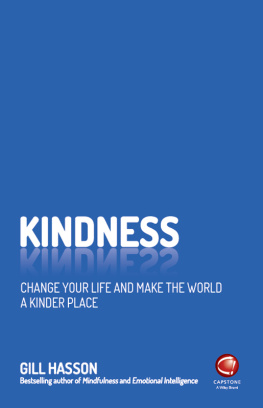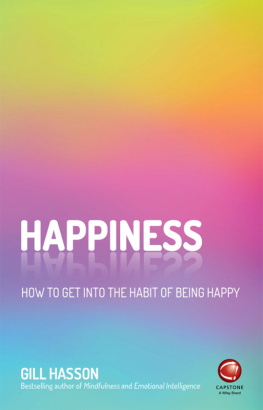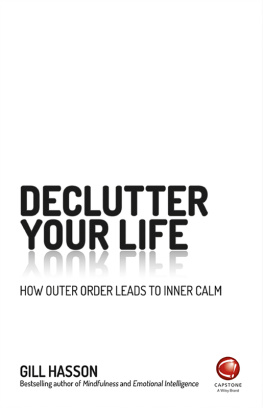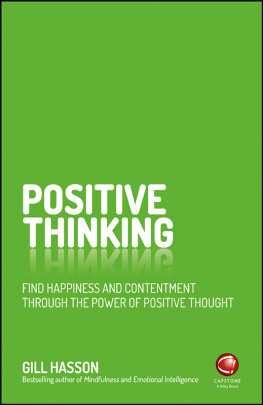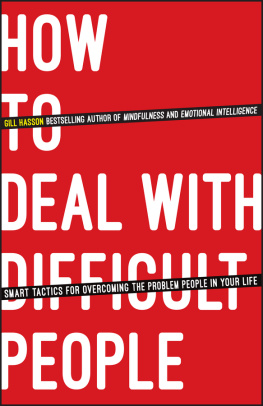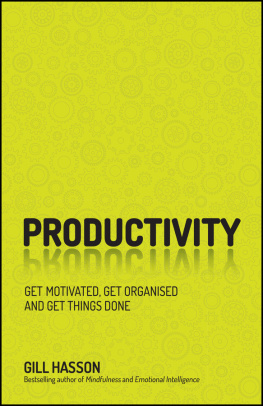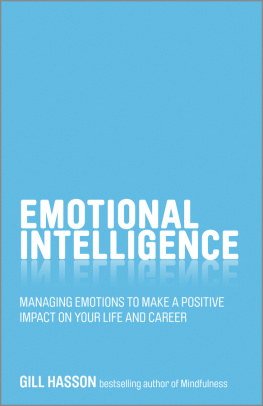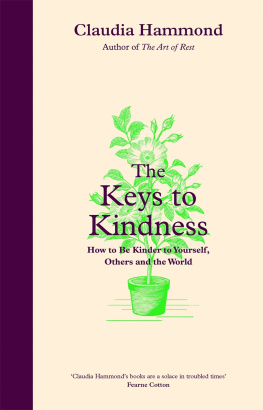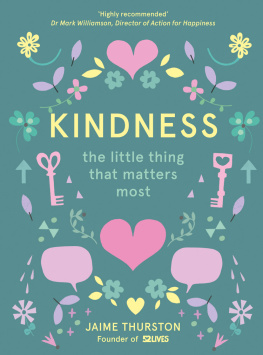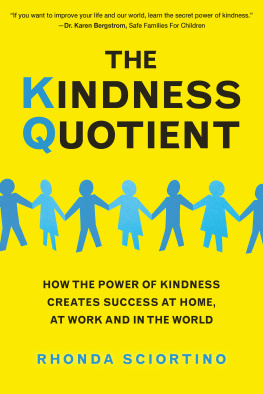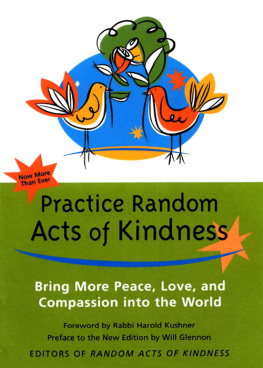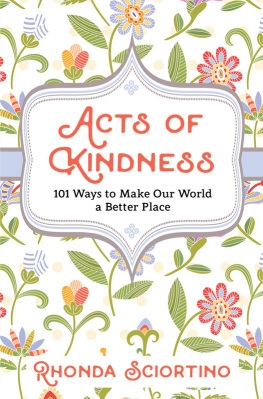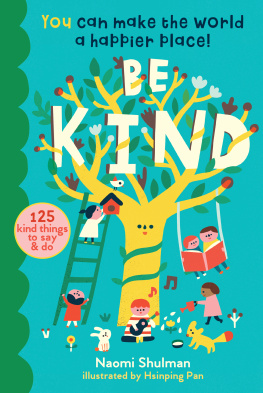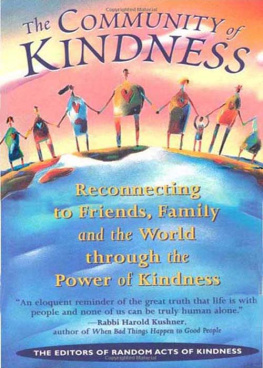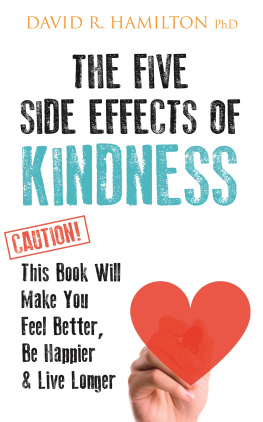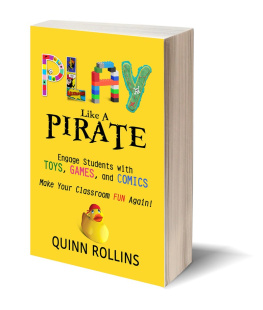
Kindness
Change your life and make the world a kinder place
Gill Hasson
This edition first published 2018
2018 Gill Hasson
Registered office
John Wiley & Sons Ltd, The Atrium, Southern Gate, Chichester, West Sussex, PO19 8SQ, United Kingdom
For details of our global editorial offices, for customer services and for information about how to apply for permission to reuse the copyright material in this book please see our website at www.wiley.com.
Gill Hasson has asserted her right under the Copyright, Designs and Patents Act, 1988, to be identified as the author of this Work.
All rights reserved. No part of this publication may be reproduced, stored in a retrieval system, or transmitted, in any form or by any means, electronic, mechanical, photocopying, recording or otherwise, except as permitted by the UK Copyright, Designs and Patents Act 1988, without the prior permission of the publisher.
Wiley publishes in a variety of print and electronic formats and by print-on-demand. Some material included with standard print versions of this book may not be included in e-books or in print-on-demand. If this book refers to media such as a CD or DVD that is not included in the version you purchased, you may download this material at http://booksupport.wiley.com. For more information about Wiley products, visit www.wiley.com.
Designations used by companies to distinguish their products are often claimed as trademarks. All brand names and product names used in this book are trade names, service marks, trademarks or registered trademarks of their respective owners. The publisher is not associated with any product or vendor mentioned in this book.
Limit of Liability/Disclaimer of Warranty: While the publisher and author have used their best efforts in preparing this book, they make no representations or warranties with respect to the accuracy or completeness of the contents of this book and specifically disclaim any implied warranties of merchantability or fitness for a particular purpose. It is sold on the understanding that the publisher is not engaged in rendering professional services and neither the publisher nor the author shall be liable for damages arising herefrom. If professional advice or other expert assistance is required, the services of a competent professional should be sought.
Library of Congress Cataloging-in-Publication Data
Names: Hasson, Gill, author.
Title: Kindness : change your life and make the world a kinder place / by
Gill Hasson.
Description: Hoboken, NJ ; Chichester, UK : John Wiley & Sons, 2018. |
Includes index. |
Identifiers: LCCN 2018003945 (print) | ISBN 9780857087522 (pbk.)
Subjects: LCSH: Kindness. | Conduct of life.
Classification: LCC BJ1533.K5 (ebook) | LCC BJ1533.K5 H37 2018 (print) |
DDC 177/.7--dc23
LC record available at https://lccn.loc.gov/2018003945
A catalogue record for this book is available from the British Library.
ISBN 978-0-857-08752-2 (pbk)
ISBN 978-0-857-08767-6 (ebk)
ISBN 978-0-857-08766-9 (ebk)
Cover Design: Wiley
To my grandmother Y Lily and her sister, my great aunt, Thea Litsa.
Introduction
We are all here on earth to help others; what on earth the others are here for I dont know.
comedian John Foster Hall, quoted by W. H. Auden
We need more kindness!
Its easy to think that bad things happen in the world all the time; a continual stream of headlines describing all sorts of horrors and wrongdoings can keep us in a near permanent state of worry and mistrust. Sometimes it can feel like everyones out to get each other. Having to deal with constantly horrifying news is not good for any of us. But what, if anything, can you do about it all?
In his book The Seven Habits of Highly Effective People, Stephen Covey explains the concept of the Circle of Concern and the Circle of Influence. The Circle of Concern is the area that we have no control over but that we often spend time and energy getting caught up in; getting wound up and worried about.
A wide range of events the economy, war and terrorism, the behaviour of celebrities, sports stars and politicians, for example fall into the Circle of Concern. You have little or no control over these events, but you can easily consume more and more information about them. It drains your time and energy and can leave you feeling stressed, helpless and negative simply because you have little or no control over these events.
The Circle of Influence, on the other hand, is the area that you do have control over. It involves the issues and events that you can influence in your daily life: where you go, what you do and, most importantly, your interactions with family and friends, colleagues and neighbours the people you talk to or meet each day. You can do something about the issues, events and people in your Circle of Influence. You can be kind.
Instead of reacting to or worrying about people and events over which you have little or no control, you can focus your time and energy on things you can control. You can reach out to others and make a positive difference: you can be kind.
Think of a time you helped out another person. What did you do? Maybe you helped someone with some work they were struggling with. Perhaps you explained something to someone and made a difficult concept easier to understand. Were you able to help someone in need; someone in pain or distress? Perhaps you simply did someone a favour. Whatever it was, after youd helped them, how did you feel? How did you feel about yourself, the other person and the world?
Although kindness and consideration expect no reward or recognition, being aware of and doing something to benefit someone else can make you and the person you are helping feel good. Chapter 1 of Kindness explains the many benefits of being kind; it explains how acts of kindness helps people feel respected, valued and worthy. It helps them to feel connected to others; to feel theyre included, they belong and are appreciated. Kindness helps make people happy. In fact, kindness is contagious: experiencing, seeing or hearing about acts of kindness inspires others to do something kind themselves.
How, though, do you learn to be kind? You already are! Its innate in each and every one of us to be kind to show care and concern, to want to help others. Kindness is in you and its all around you. You just need to be more aware of it and use it more often. Kindness shows you how.
There are two parts to this book: Part 1 explains how to reach out to others and show your sympathy and empathy, your care, concern and consideration. Youll learn the importance of being welcoming to others; how to include them, be supportive and encouraging, and not just say thanks and express appreciation for what someone does for you, but to show appreciation.
There are limits to kindness though. Kindness isnt synonymous with weakness. You can be kind, considerate, generous and compassionate without being walked all over. Being kind is not about being a people pleaser people pleasing is not coming from a genuine place of kindness; people pleasing is actually meeting your own need to be liked, rather than just wanting to make a positive difference.
Although there are situations and circumstances where an act of kindness on your part may mean putting yourself out, youre encouraged to do whatever feels natural and within your ability; to contribute what youre good at, not what youre no good at doing or not able to give.
Next page
